«oriente, palabra espléndida que abarca la aurora y tantas y famosas naciones» (J.L.Borges)
A few 35mm photos from a recent visit to Hong Kong, one of the vast, beautiful, and unforgettable cities in the world.
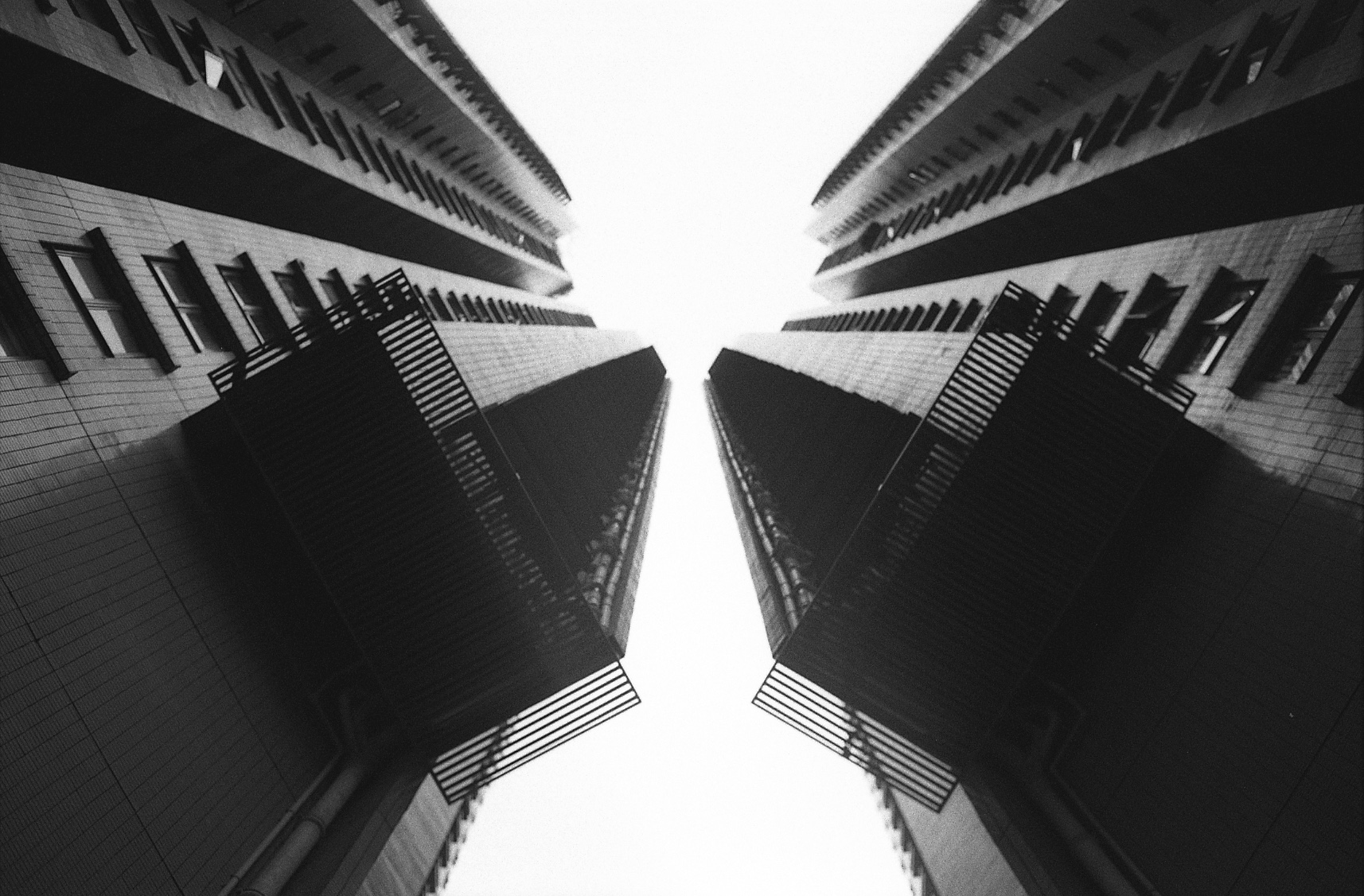
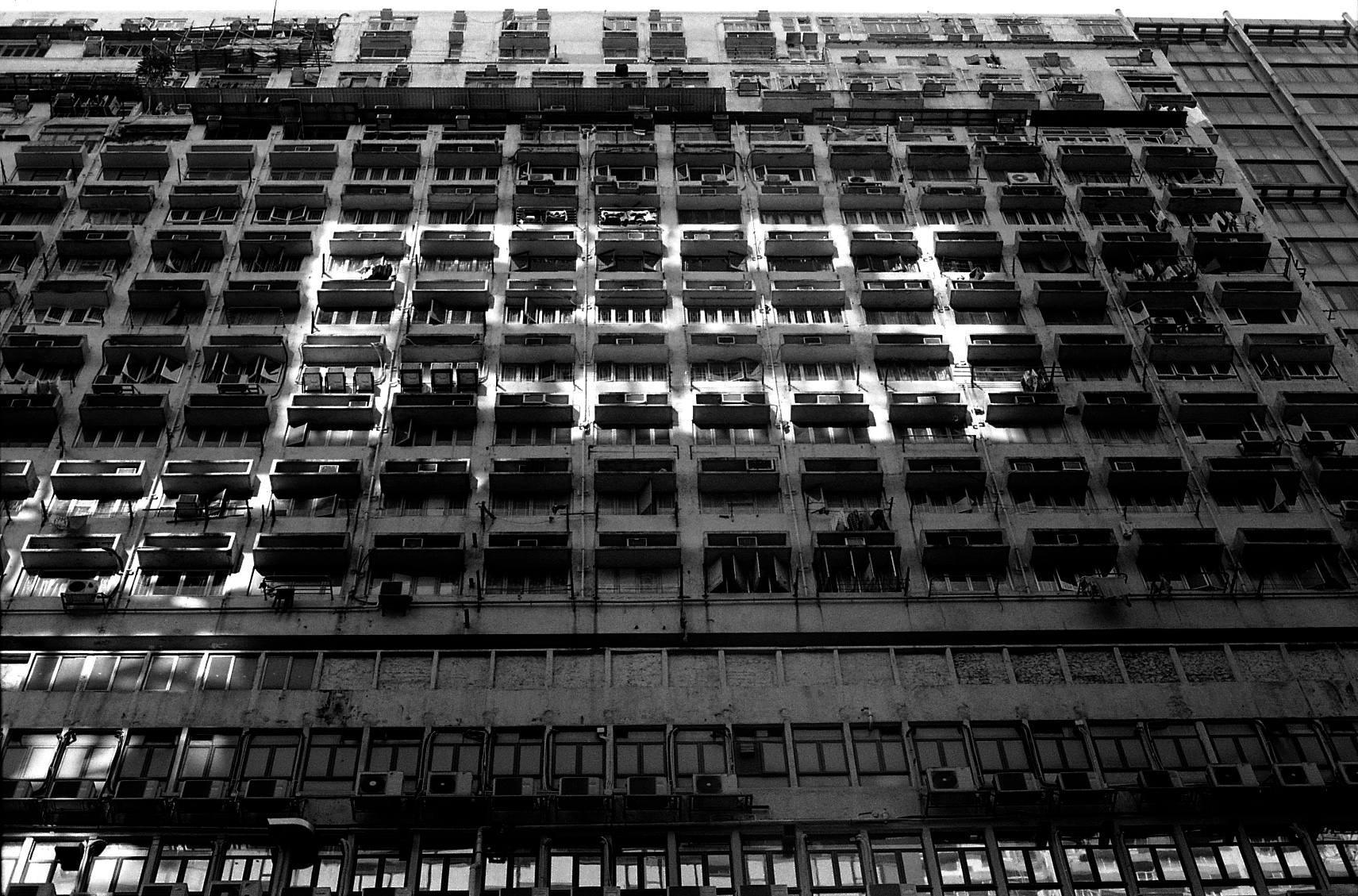
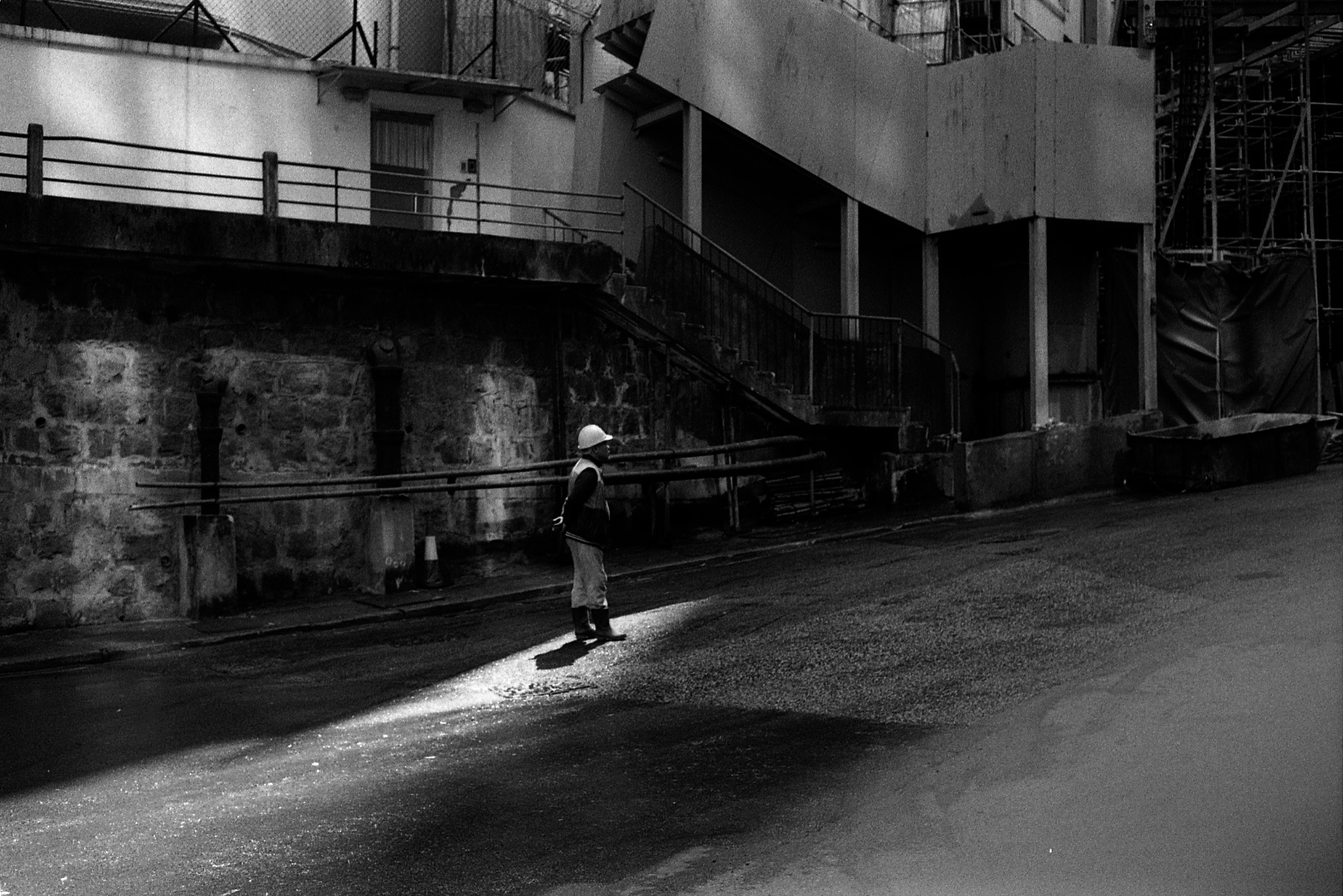
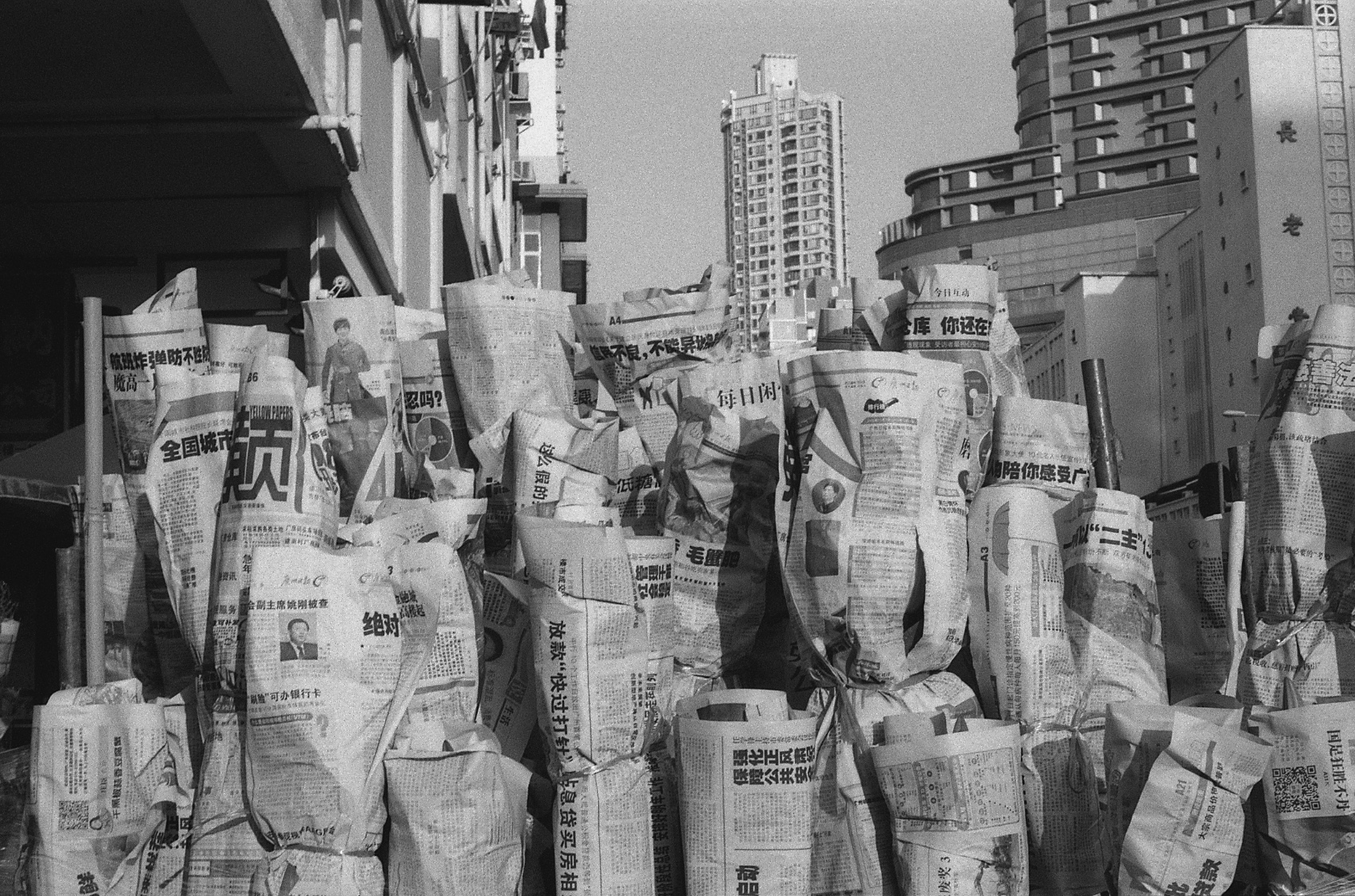
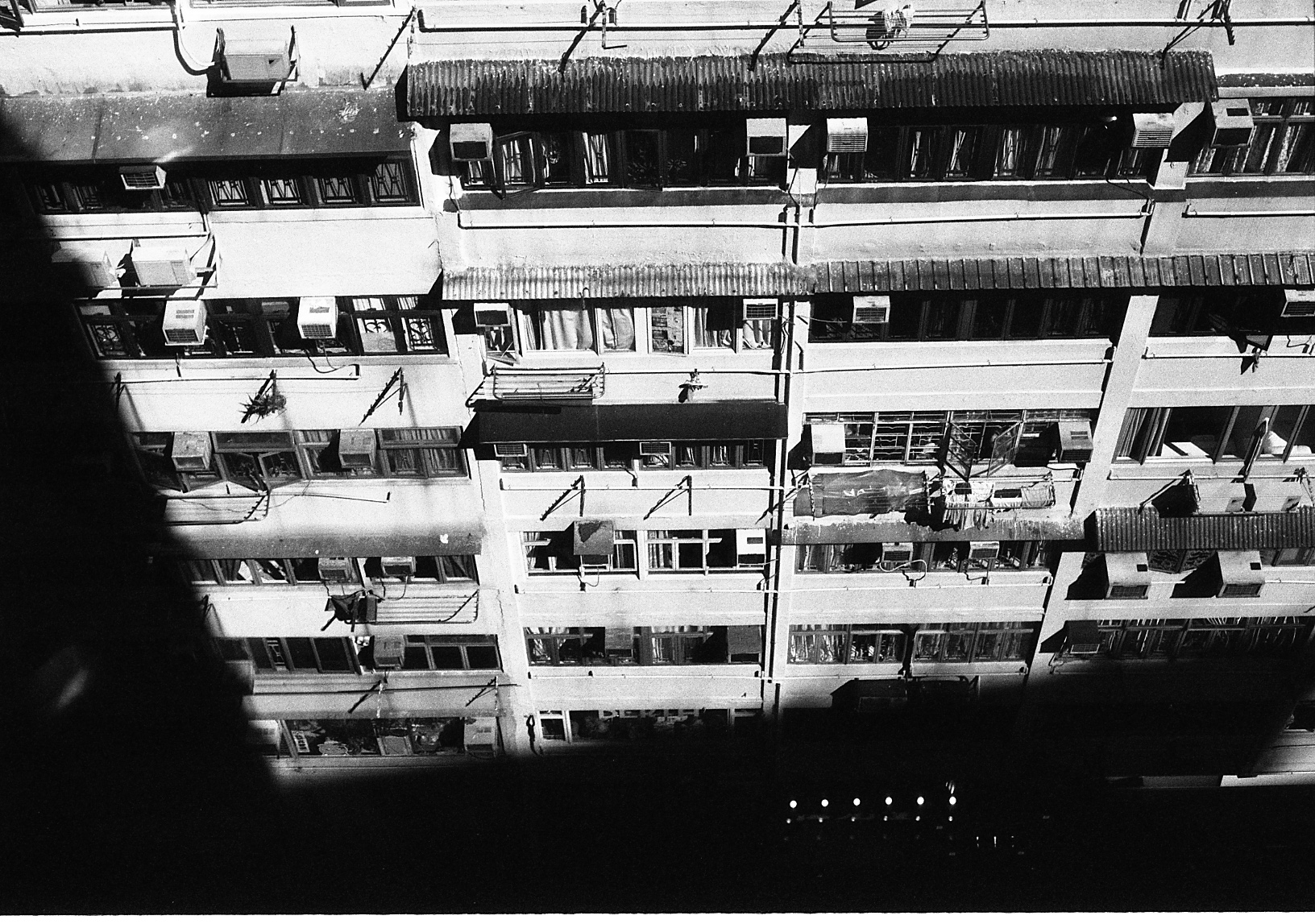
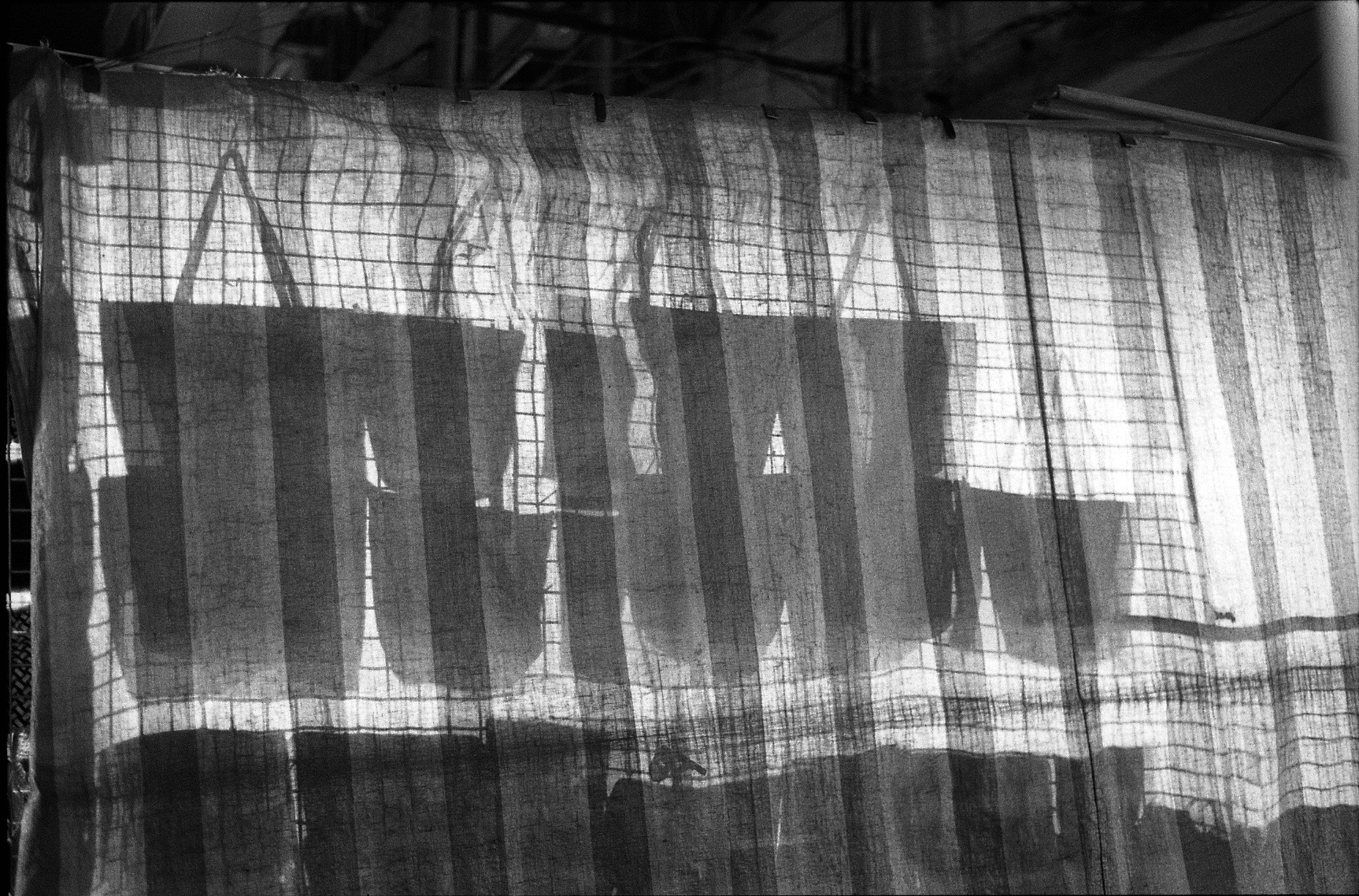
Forthcoming - «Golden House» music video
Over the last months, I've been working on a music video of the track «Golden House» for the band Tiburones—off their new album «Eva». I'm very excited to release this work—I filmed and collaborated closely with band members Nick Delffs (also known for his bands Shaky Hands and Death Songs) and Luz Elena Mendoza (from Y La Bamba). The music video will be released along with the vinyl and digital release of «Eva» very soon.
A few still frames from «Golden House»—filmed in New Mexico, Arizona, the desert of eastern Oregon, and Portland.
«Forgetting the extermination is part of the extermination itself»
I read once—I don't recall where—that an atomic test in the southwestern United States turned the desert sand into glass. This glassy residue was named Trinitite, an ignoble commemoration of the Trinity nuclear bomb test. The memory of this image led me to research other nuclear tests in the South Pacific—no less terrible or astounding—and I came across archival footage of the tests, released by the U.S. government. With this footage, I've been working on a short form video: BIKINI ATOLL. My goal is to expand this material to a layered, multi-screen installation.
UNESCO provides us with this information about the tests:
In the wake of World War II, in a move closely related to the beginnings of the Cold War, the United States of America decided to resume nuclear testing. They choose Bikini Atoll in the Marshall archipelago in the Pacific Ocean. After the displacement of the local inhabitants, 23 nuclear tests were carried out from 1946 to 1958,. The cumulative force of the tests in all of the Marshall Islands was equivalent to 7,000 times that of the Hiroshima bomb. Following the use of nuclear bombs at Hiroshima and Nagasaki, the Bikini tests confirmed that mankind was entering a “nuclear era”. The many military remains bear witness to the beginnings of the Cold War, the race to develop weapons of mass destruction and a geopolitical balance based on terror.
The violence exerted on the natural, geophysical and living elements by nuclear weapons illustrates the relationship which can develop between man and the environment. This is reflected in the ecosystems and the terrestrial, marine and underwater landscapes of Bikini Atoll.
The nuclear tests changed the history of Bikini Atoll and the Marshall Islands, through the displacement of inhabitants, and the human irradiation and contamination caused by radionuclides produced by the tests.
«Allá, donde el aire cambia el color de las cosas...» (Juan Rulfo)
I've been filming a documentary about the practices and philosophies of plant collectors. Last week, I had the good fortune to accompany a group to Arizona and New Mexico, where I spent five days filming, traveling from Tucson to Mount Lemmon, from the Peloncillo, Chiricahua and Dragoon mountains to the border town of Douglas, Arizona. We saw fields of yucca, opuntia, agave, cholla, ocotillo, oak, pine; sun turned to rain, sleet, and snow.
In the remote regions, we saw very few vehicles, save for border patrol agents and ranchers. The group collected seeds and cuttings, reaching elevations up to 8000 feet. Sean Hogan of Cistus Nursery organized the trip, and I've filmed Sean on previous trips to Mt. Hood and the Siskiyou mountains in Oregon. My goal for this project is to document an array of collecting practices in differing climates, geographies, seasons.
A few trip photos from my phone, below.
Notes - THE LOOK OF SILENCE
One of the least forgettable scenes—of many unforgettable scenes—in THE LOOK OF SILENCE is towards the end of the film, where Adi’s father is stumbling, lost and distraught.
When I first saw the film, this was one of the more discomforting scenes, because I, as a viewer, was complicit with representing this man’s suffering, who seems unaware of the camera. What's more, it does not seem that Adi's father could agree or decline to be filmed in that moment. I asked myself: ‘Why did the filmmakers include this scene of torment and dementia? What right do they have to show this? What right do I have to see this?’
Then I listened to and read interviews with Joshua Oppenheimer, and learned that the scene is the only one in the film that Adi himself shot.
Here is an excerpt that addresses this scene:
Adi said, "Let me tell you why this is so important to me." He went and he got the camera that I had given him and he got one tape. He said, "I never sent you this tape, because it's very meaningful for me. But I think it'll explain, if you see it, you'll understand why this matters." Trembling, he took the tape, he immediately started to tremble, visibly. And put the tape in the camera, pressed play. As soon as the image came on the screen, he started to cry. He showed me the one scene in the film that Adi shot in The Look of Silence. It's a scene where his father is crawling through the house at the very end of the film. Lost, calling for help.
He said, "This was the first day my father couldn't remember me, my brothers and sisters or my mother. He was confused and lost all day. We were trying to comfort him. But we couldn't, because we were strangers to him and it was unbearable for me to just sit and not be able to help him. Eventually, not knowing what else to do, wanting to be close to him, I started to film." He said, "I couldn't comfort him. I couldn't touch him, because he'd get afraid, but because he can't see, I could be close to him.
"The moment I picked up the camera and I knew why I was filming," he said, "because this is the moment, from now on, it's too late for my father. It's too late for him to heal, because he's forgotten the son whose murder destroyed our family's life. But he hasn't forgotten the fear. He'll never forget the fear, because he will never be able to work through it anymore. He'll never be able to remember what happened, work through it and grieve and mourn and heal." So he's like a man, he said, "Dad's become like a man trapped, locked in a room, who can't even find the door, let alone the key. And I don't want my children to inherit this prison of fear from my father and from me.
After learning the details of how this scene was filmed, I had the temporary sense that my guilt and complicity was lessened: Adi is a family member who has, perhaps, more of a right to film his distraught father than the official film crew, and because this scene was not a part of the official production and rather the impetus for the production, somehow it is more genuine or less unethical. Because Adi shot this scene, I felt for a moment that I had been granted permission to view his father in this way.
Only later did I examine my responses, and a possible and partial truth emerged: the reason that this scene disturbed me was neither my intial response—a suffering father portrayed by a film crew—nor my second response—Adi filmed the scene and because of this, we are given permission to view it—.
Instead, I am convinced that what is truly beautiful and haunting and tragic about this scene is that a human being is stripped of the performances that we enact in our daily lives. This man is suffering in front of a camera of which he is unaware. THE ACT OF KILLING and THE LOOK OF SILENCE examine the stories and lies that we tell ourselves, to destroy or condemn others, to forgive or absolve ourselves. Yet this man, lost in a room, is no longer performing for anyone, and that terrible and fearful and unaware suffering is what I am unable to forget.
"That is to say, more honest and more cruel."
I made the short CUSTOMER COPY about two years ago, intended to accompany the brief essay that is included here in Spanish and English. I had the good fortune of forgetting this work, and now, at last, I am able to observe it with less pity and more honesty, for it no longer belongs to me.
CUSTOMER COPY [ english ]
RECEIPTS—like photographs, tweets, text messages, telegrams—are narrative products of exchange. Commerce generates these footprints; cash registers are the scribes. One can construct a novel, report or documentary with only receipts. An indisputable compendium of a life.
Receipts are so precise that they disallow us the wonders of forgetting. A portrait made of receipts would be less unfaithful that selfies, autobiographies, CVs, diplomas, elegies. That is to say, more honest and more cruel.
Receipts produce an exact memory of surveilled moments. I confess that sometimes I make purchases without wanting to, simply to justify my presence in a space. Receipts are brief rental payments.
Are they maps as well? Without a doubt, receipts catalogue our movements: I know that at 3:57 in the afternoon, October 16, 2013, on 171 Spring Street, New York, NY (zip code 10012), I paid $14.88 to a waiter named Thaddeus. One assumes that a few minutes later (not knowing how many minutes), I wrote—with a borrowed pen—the three dollars for the tip. This receipt provokes other, less exact memories: I recall whom I was with, of some of the dishes we ate, where we went afterwards. It is inevitable to declare that I don’t remember the server Thaddeus at all. Could he exist? It’s plausible that he does not remember us either. The name Thaddeus brings to mind another Thaddeus, a classmate from eighth grade, with whom I went to a basketball tournament, and who wanted to be an engineer specializing in demolitions—a profession which, at that time, awoke in me a certain juvenile distrust. What is certain is that, many years later, the waiter Thaddeus in New York has not kept any proof of my existence, at the tenth table, at three pm, on a day in October.
CUSTOMER COPY [ español ]
LOS RECIBOS—como las fotografías, los tuits, los mensajes de texto, los telegramas—son productos narrativos de intercambio. El comercio genera estas huellas; los escribanos son las cajas registradoras. Se puede construir una novela, un reportaje o un documental sólo con los recibos. Compendio incuestionable de una vida.
Los recibos son tan precisos que nos prohíben la maravilla del olvido. Un retrato hecho de recibos sería menos infiel que los selfies, las autobiografías, los CV, los títulos, las elegías. Es decir, más honesto y más cruel.
Los recibos producen una memoria exacta de los momentos vigilados. Confieso que a veces compro sin querer, sólo para justificar mi presencia en un espacio. Los recibos son pagos breves de alquiler.
¿Son mapas a la vez? Sin alguna duda los recibos cartografían nuestros movimientos: bien sé que a las 3:57 de la tarde, el 16 de octubre 2013, en 171 Spring Street, Nueva York, NY (código postal 10012), a un mesero Thaddeus, pagué $14.88. Se supone que unos minutos más tarde (no se sabe cuántos) escribí con un bolígrafo prestado los tres dólares de propina. Este recibo provoca otros recuerdos menos exactos: me acuerdo de con quien estuve, de algunos platillos que comimos, de donde fuimos después. Resulta inevitable señalar que no me acuerdo nada del mesero Thaddeus. ¿Será que existe? Es verosímil que él tampoco se acuerda de nosotros. El nombre Thaddeus me trae recuerdos de otro Thaddeus, un compañero del octavo grado, con quien fui a un torneo de basket y que quería ser ingeniero especializado en la demolición, vocación que en ese entonces me asombraba y me inspiraba una cierta desconfianza juvenil. Lo cierto es que, muchos años después, el mesero Thaddeus en Nueva York no ha guardado ninguna prueba de mi existencia, en la décima mesa a las tres PM, un día de octubre.
In progress - hand binding a new folio SHADE OF SACRED TREES, a collection of botanical photography shot on 35mm. Printed and bound in Portland.
Reading notes from Absalom, Absalom!
There are passages in certain texts that one returns to, almost without trying, as if by gravity. Not unlike the beginning of the Quentin chapter in The Sound and the Fury, this passage from Absalom, Absalom! continues to astonish. Haiti, language, colonies.
«—a spot of earth which might have been created and set aside by Heaven itself, Grandfather said, as a theater for violence and injustice and bloodshed and all the satanic lusts of human greed and cruelty, for the last despairing fury of all the pariah-interdict and all the doomed—a little island set in a smiling and fury-lurked and incredible indigo sea, which was the halfway point between what we can the jungle and what we call civilization, halfway between the dark inscrutable continent from which the black blood, the black bones and flesh and thinking and remembering and hopes and desires, was ravished by violence, and the cold known land to which it was doomed, the civilized land and people which had expelled some of its own blood and thinking and desires that had become too crass to be faced and borne longer, and set it homeless and desperate on the lonely ocean—a little lost island in a latitude which would require ten thousand years of equatorial heritage to bear its climate, a soil manured with black blood from two hundred years of oppression and exploitation until it sprang with an incredible paradox of peaceful greenery and crimson flowers and sugar cane sapling size and three times the height of a man and little bulkier of course but valuable pound for pound almost with silver ore, as if nature held a balance and kept a book and offered a recompense for the torn limbs and outraged hearts even if man did not, the planting of nature and man too watered not only by the wasted blood but breathed over by the winds in which the doomed ships had fled in vain, out of which the last tatter of sail had sunk into the blue sea, along which the last vain despairing cry of woman or child had blown away—the planting of men too; the yet intact bones and brains in which the old unsleeping blood that had vanished into the earth they trod still cried out for vengeance. And he overseeing it, riding peacefully about on his horse while he learned the language (that meager and fragile thread, Grandfather said, by which the little surface corners and edges of men’s secret and solitary lives may be joined for an instant now and then before sinking back into the darkness where the spirit cried for the first time and was not heard and will cry for the last time and will not be heard then either)»
Printing and binding a short run zine of botanical photography, with brief quotations about plants from J.L. Borges. Available soon.

Reading notes from Jorge Luis Borges
«se manejaba con fluidez e ignorancia en diversas lenguas; en muy pocos minutos pasó del francés al inglés y del inglés a una conjunción enigmática de español de Salónica y de portugués de Macao.»
«la fiebre y la magia consumieron a muchos hombres que codiciaban magnánimos el acero.»
«la luna tenía el mismo color de la infinita arena.»
«otro es el río que persigo, replicó tristemente, el río secreto que purifica de la muerte a los hombres.»
«el silencio era hostil y casi perfecto»
«sentí que era anterior a los hombres, anterior a la tierra»
«ignoro si todos los ejemplos que he enumerado son literales»
«después vi que es absurdo imaginar que hombres que no llegaron a la palabra lleguen a la escritura»
«se preocupaba menos de la belleza que de la perfección»
«los hebreos y los chinos codificaron todas las circunstancias humanas»
«serían las dos de la mañana cuando salí. Afuera, las previstas hileras de casas bajas y de casas de un piso habían tomado ese aire abstracto que suelen tomar en la noche, cuando la sombra y el silencio las simplifican.»
«Ebrio de una piedad casi impersonal, caminé por las calles»
«Tal vez quiso decir que no hay hecho, por humilde que sea, que no implique la historia universal y su infinita concatenación de efectos y causas»
«En las horas desiertas de la noche aún puedo caminar por las calles»
«el propósito de llegar a los hombres que saben lo que es el mar»
«sin más virtud que la infatuación del coraje»
«Murió sin miedo; en los más viles hay alguna virtud»
«vaga por las calles de Montevideo, con incontestada y tal vez ignorada tristeza»
«lo atrae el puro sabor del peligro, como a otros la baraja o la música»
«una vida distinta, una vida de vastos amaneceres»
«oscuramente lo enriquece de selvas populosas, de ciénagas, de inextricables y casi infinitas distancias»
«no sabe si atribuir su reserva a la hostilidad, a desdén o a mera barbarie»
«son atributos o adjetivos de un hombre que él aspira a destruir»
«dilatar la vida de los hombres era dilatar su agonía y multiplicar el número de sus muertes»
«carecen del comercio de la palabra»
«fatigamos otros desierto, donde es negra la arena, donde el viajero debe usurpar las horas de la noche, pues el fervor del día es intolerable»
«Algunos temerarios durmieron con la cara expuesta a la luna; la fiebre los ardió; ene l agua depravada de las cisternas otros bebieron la locura y la muerte»
«bajo el último sol o bajo el primero»
«Varios días erré sin encontrar agua, o un solo enorme día multiplicado por el sol, por la sed y por el temor de la sed»
«se habían contagiado de mi inquietud»
«hacia la medianoche, pisé, erizada de formas idolátricas, en la arena amarilla, la negra sombra de sus muros»
«hay quien busca el amor de una mujer para olvidarse de ella, para no pensar más en ella.»
reading notes from an interview with Carlos Reygadas
«Declaring a philosophical, religious, or social truth will turn it into dogma and therefore will prevent it from being experienced as real; it will always be normative. On the contrary, what feels real is poetic, ineffable, open-ended. Truth, by definition, is intangible.»
«My screenplays are not literary in the way that most screenplays are literary. Mine are images and sounds»
«in Mexican telenovelas, when they want to represent a rural tiendita (a bodega), they’ll have three shelves stacked with the products that people assume are always sold there as well as a middle-aged señora with an apron at the register. Everyone gets used to seeing that tiendita, the code representing it, that is, instead of the real thing. If we went to a real tiendita right now and the camera was rolling, we’d discover a number of incredible surprises there and people would appreciate having access to a different visual experience. Maybe we find a dead cat hanging from a wall, or a poster we’d never imagine we’d find there. Reality has so many things to offer, things you wouldn’t have arrived at via your own imagination.»
«my films are always so much better than I could have ever dreamed of, not because the end result is magnificent, but because they utilize things that were unthinkable to me before making them»
«These are things I didn’t imagine before, I only allowed my camera to absorb them.»
«For the gas-station scene, I imagined the conjunction of something sacred and something all too human and mundane, an engine. Only humans can create music and engines. One is the most poetic, divine, ethereal of our inventions, and the other the most practical, the most functional, but both are distinctly human.»
«I can’t believe that in England, the country that birthed democracy, Japón, to this date, is censored: they cut the scenes in which the pigeon is killed and the village’s veterinarian tickles a little dog. The country with the most infamous colonial history thinks that by censoring my film they’ve paid for their sins»
«Silent Light could be seen as a better documentary on Mennonites in Mexico than one produced by National Geographic. They’ll tell you the whereabouts and indexes of Mennonites in Mexico, but you’ll never see them making love, having an intimate conversation, bathing with their families in a pool, or dying.»
reading notes from Biblioteca personal - prólogos by Jorge Luis Borges
these notes, and everything that Borges wrote, recall what he declared at the beginning of Siete noches: «De mí sé decir que soy lector hedónico»
«las divinidades eran las mismas pero los nombres cambiaban en cada lengua»
«Oriente, palabra espléndida que abarca la aurora y tantas y famosas naciones»
«atribuyó a los egipcios la división del año en doce meses gobernados por doce dioses»
«Cicerón, que no ignoraba que en griego la palabra historia quiere decir investigación y verificación»
«Emily Dickinson creía que publicar no es parte esencial del destino de un escritor. Juan Rulfo parece compartir ese parecer»
«un texto fantástico, cuyas indefinidas ramificaciones no le es dado prever, pero cuya gravitación ya lo atrapa»
«fue el menos contemporáneo de los hombres»
reading notes from an interview with Apichatpong Weerasethakul
«For me, listening to heartbeats through a stethoscope or using a magnifying glass with a light was already magic. On rare occasions I was treated with a view through a microscope. Another exciting memory was to watch 16mm films at the American institution in Khon Kaen. They had bases in the northeast during that time to counter communism. I remember very well the black and white King Kong, among other films. The movies and medical tools were the best of inventions for my childhood.»
«At one point I was reading articles about brain science. There was an MIT professor who manipulated brain cells into re-enacting certain memories, via lights. He said that the findings sort of disproved Descartes’ belief that the mind and the body are separate entities. This hypothesis aligned with my thinking that meditation is nothing more than a biological process. Sleep and memory can always be hacked into. If I were a doctor I would try to cure sleeping sickness by light interference at a cellular level. The lights in this film vaguely reflect this idea. They are not only for the soldiers but also for the audience as well.»
«When we were young we were told about this most amazing place where the water is full of fish and the land covered in rice fields. The signs of wealth were always idyllic, omitting the brutalities. We have this burden of fabricated history. It effects generations: how do we view ourselves? With the information that is surfacing and recent studies, our sense of identity is shifting. I think the film plays with this shaky sense of belonging.»
reading notes from an interview with Bela Tarr
«I learned a very simple yet fundamental thing: respecting people, their life and their dignity.»
«In my view, there is no difference between an amateur and a professional. In order to direct a film you don’t need any film school diploma or professional certificate of sorts: that’s for sure.»
«You know, for me it is ridiculous when a director says “it is my film.” It is everybody’s film, because filmmaking is a collective work that requires the talent of all the members of the crew. And not only the talent, but also the physical presence and the spirit, the brain, the sensibility, the empathy of every person on the set. I have always worked with, more or less, the same people, because I feel safe with them, and I know I can fully trust them.»
«What is essential cannot be learned, it has to be experienced.»
reading notes from an interview with László Krasznahorkai
«Let me reply to that by telling you a story. Mihály Vig and I were walking along a street in Pécs together, and I was complaining to him that young people today are so terribly far removed from anything spiritual and intellectual. I said that when I was young, there was at least a handful of us who used to read, compose music, or paint pictures. In other words, we were thinking beings and were possessed by a search for something, which connected us. I was saying that this seems to have died out. To this, Mihály said to me that he thought I was wrong – the people I am thinking of still exist in the same numbers today, but they are not visible. And, pointing up at the windows there, that evening at Pécs, he asked me, “How do you know there is not one sitting up there right now? It is just that they don’t want to meet you as an ‘author’. They are busy. They cannot bear this world and are in some way testing a different one. Perhaps by creating something. Perhaps they are just sad and that’s why they can’t come. And that sadness will lead to something. To another gap for seeing out of the intolerable through to the tolerable. Or,” said Mihály, “he or she is sitting up there alone, reading your book, of all people’s.»
reading notes from miscellaneous interviews with Joshua Oppenheimer
«this should be not a film simply about impunity and coexistence, this should fundamentally be a film about memory and oblivion, because that’s the real casualty of living for decades in fear.»
«if you overcome the fear of looking, you come out less afraid.»
«the capacity for human evil depends on our ability to lie to ourselves.»
«it was painful to deny myself the escapism of saying 'These men are monsters and they just should be judged', it was painful to not give my self the comfort of saying 'My role is to judge them or build a case and condemn them', because after all the role of artists aught not to be that of a court. We aught to be trying to understand, not trying to condemn. We aught to be trying to empathize - not sympathize. And we should take it for granted that our audiences are smart enough to understand that mass murder is wrong. If we don't understand that, we should get out of this business.»